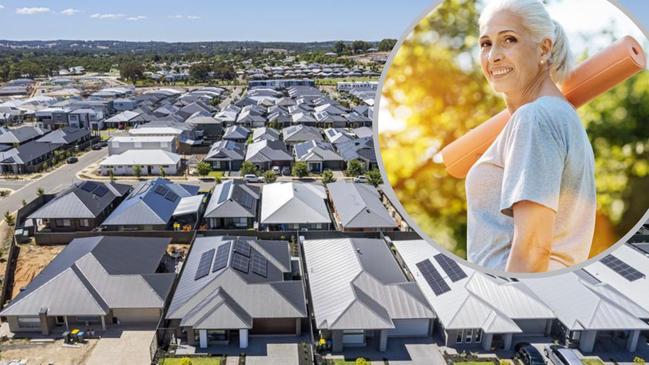Housing crisis: Bid to fix Australia’s ‘silver tsunami’ of empty homes
Australia’s ‘silver tsunami’ is raising unprecedented challenges as baby boomers refuse to leave empty homes they can’t look after, prompting a push that could save taxpayers $100m a year.

Property
Don't miss out on the headlines from Property. Followed categories will be added to My News.
Australia’s ‘silver tsunami’ is raising unprecedented challenges as baby boomers refuse to leave empty homes they can’t look after, prompting a push that could save taxpayers $100m a year.
Property Council of Australia Retirement Living Council executive director Daniel Gannon has called for a rethink of home care for elderly Australians ahead of a 70 per cent surge in the number of people aged over 75 over the next decade and a half.
MORE: Call for last homeowners’ bonus to free up houses
Baby Boomer riches ‘a good thing’ for first-home buyers

Over 1.4m older Aussies currently live in oversized increasingly empty homes – almost three quarters of those aged over 75 – requiring home care services that are increasingly costly to deliver across the breadth of the nation’s suburbs.
An RLC report found one in five Australians over 65 needs help with domestic tasks like property maintenance (20 per cent) and household chores (16 per cent).
“This suggests that the majority of older people are not right sizing, and many are requiring extra support to continue living in their family home. Larger dwellings can also increase health risks as people age, with most cases of falls in older people occurring at home.”
Mr Gannon called for a new framework to be put in place – Shared Care – which RLC believes could save taxpayers up to $100m a year by allowing retirement village operators to be focal points for home care in communities, funnelling support services for those living in their own homes.
“Retirement villages provide scale for delivering these services efficiently and cost effectively by reducing travel costs incurred by service providers, increasing the frequency of service delivery, and enhancing the quality and suite of services by leveraging those already in place at these communities,” he said.

“More than one million Australians currently utilise home care services, ranging from transport to personal care. Some of these people are waiting for up to a year to access home care funding, and sadly a third of this funding is lost to administration fees before it can be used,” he said.
“This report paves a path for government to make the delivery of home care almost 20 per cent more efficient, meaning that older Australians would receive more care per dollar invested.”
Mr Gannon said earlier that those close to deciding to move out of oversized family homes may require better incentives.
“Promoting development, removing financial barriers, and increasing awareness can lead to more older Queenslanders living in retirement communities, thereby freeing up more homes for singles, couples and growing families.”
“As a priority, we will continue to advocate for the removal of financial barriers associated with the Home Equity Access Scheme, Commonwealth Rental Assistance and the Age Pension asset test to help ‘free up’ more homes for more Queenslanders.”
Mr Gannon believes if retirement units reached 14 per cent market share by 2030, thousands more older Australians would delay their entry into aged care facilities, saving taxpayers $525m a year.
National Seniors chief operating officer Chris Grice has warned that widespread fear over pension eligibility after the sale of a family home was a factor standing in the way of some people downsizing.
“Older Queenslanders who wish to downsize to a more suitable and age-friendly dwelling are reluctant to do so because of high costs and government charges,” an NS submission to the Queensland government said.
“The Australian Capital Territory (ACT), Victoria and Tasmania offer seniors a stamp duty concession to encourage downsizing, but Queensland does not. National Seniors calls on the Queensland Government to join other states and territories in implementing a stamp duty concession scheme for seniors.”
“We recommend the government adopt a similar scheme to the one offered in the ACT and Victoria where the value of the concession declines on a sliding scale relative to the value of the new home.”
FOLLOW SOPHIE FOSTER ON TWITTER




